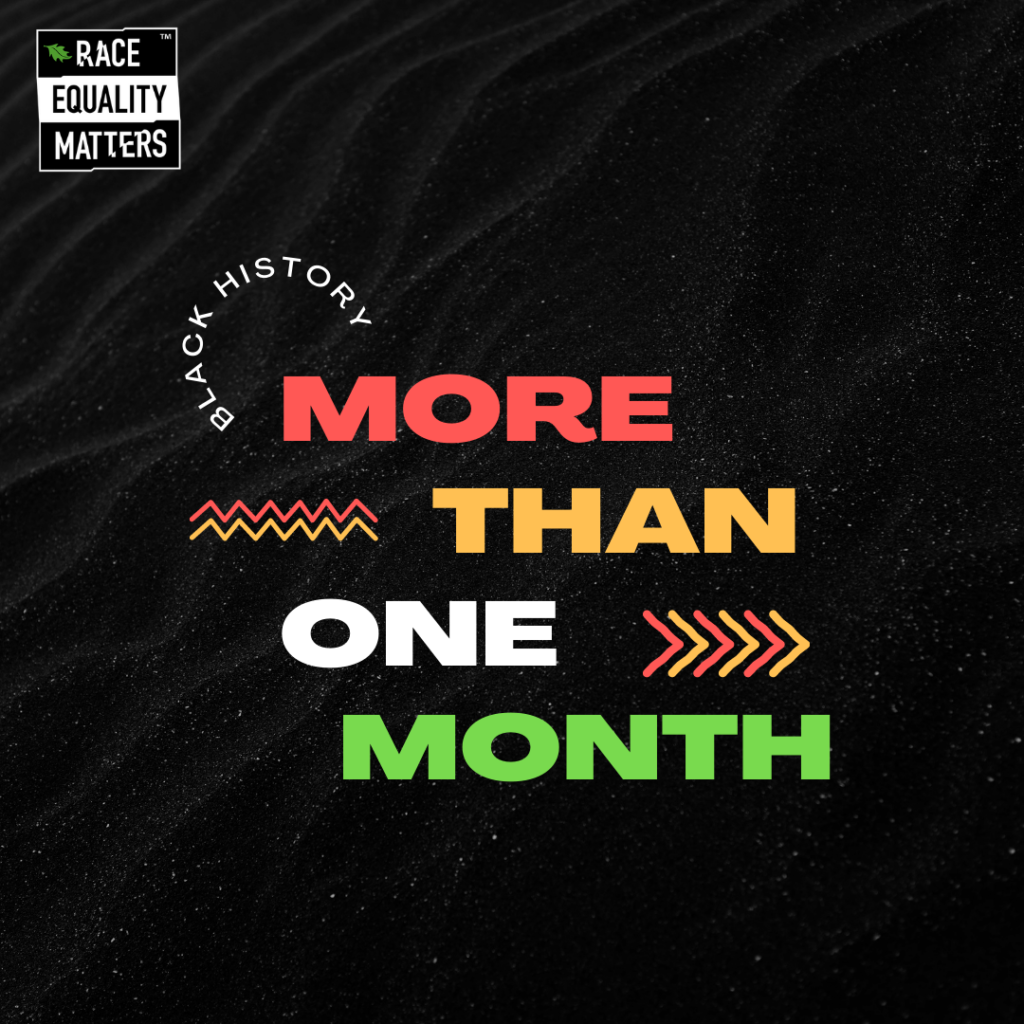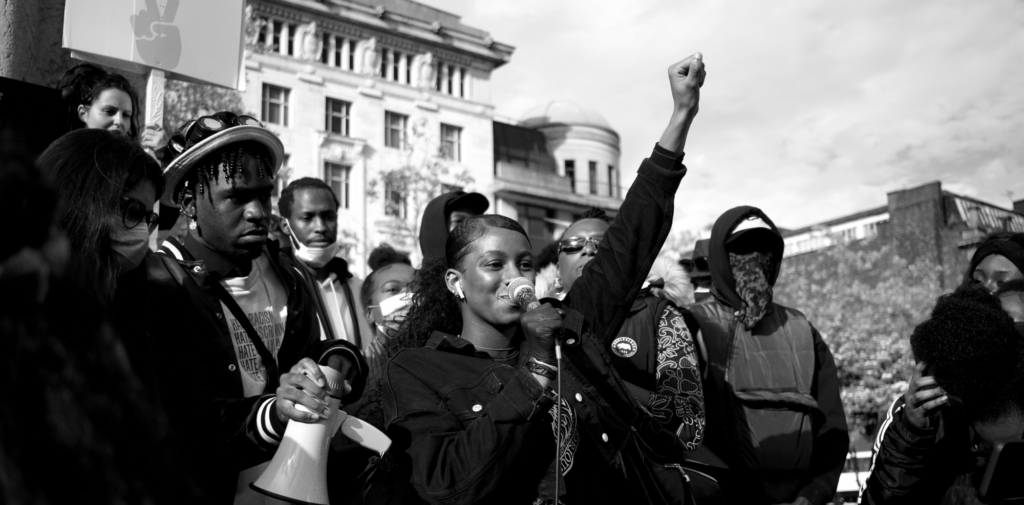As organisations start getting ready for Black History Month in October 2022, there is no better time to understand the importance of remembering black history and how this can be celebrated in the workplace. We must collaboratively use the past to create a better future.
Black History Month has been celebrated in the UK for over 30 years, with traction growing each year. It was founded to recognise the contributions of black people in Britain and is dated every October. It aims to challenge racism and educate communities about British history that was not taught in schools. Let’s help to make 2022 the most successful Black History Month yet.
As Black history is being made all the time, we must connect the past with the present to address racial inequalities. Race Equality Matter’s co-founder, Javed Thomas, reminded our community:
‘We can’t change the past, but we can change the future.”
As we reflect on the expert advice given at last year’s event, registration for our Get Ready for Black History Month event on 27th July 2022 are open. We will be guiding attendees on how to make Black History Month more impactful in their organisation. Last year Race Equality Matters hosted experts, with over 500 registrations from 350 organisations, to speak on the importance of Black History Month and how to integrate it within organisations. We heard from:
- Natalie Rose – Corporate HSE Advisor | HS2 and a Co-chair of the BAME Network.
- Elizabeth Cameron – Chair | GMCA Race Equality Panel (Greater Manchester Combined Authority)
Why is it important to celebrate Black History Month?
Black History Month can help to promote cultural celebration of Black history and provides an opportunity to learn about aspects of history that are missed from mainstream education. Elizabeth Cameron told attendees that she was never taught about Black history as a child, and it was not until later in life that she understood Black history to go beyond negative stereotypes that “To be black is to be poor.”. Elizabeth’s negative understanding of Black history impacted her notion of blackness until she developed deeper awareness of Black history and heritage. Elizabeth exemplifies the personal impact of history and our understanding of it.
The triumphs of Ancient Egypt, the stories of resistance against racism and the history beyond racial slavery is central to Black History Month and historical-cultural celebration of Black communities. Historical inspiration acts as a key motivation for Elizabeth- including her admiration for Mandela and Gandhi- as she stressed: “Nobody is perfect, but I think we can have heroes amongst us.”. The rich nature of Black history and the need to reflect on this is facilitated by Black History Month.
Natalie Rose told attendees that Black History Month helps to “myth bust” stereotypes through its function as an educational and explanatory tool for ethnic minorities and allies. She reminded attendees that whilst recognition of different cultures should happen all the time, Black History Month allows for Black history to be spotlighted:

“It is important to celebrate and recognise all cultures that exist within an organisation 365 days of the year, but Black History Month is the perfect time to do that specifically for the black community.”
Why is it important to celebrate Black History Month within organisations?
Whilst both Natalie and Elizabeth reflected on the personal importance of Black History Month, the importance of Black History Month within organisations was also stressed by both our speakers. For whilst celebration of Black history and culture is important at a personal level, recognition from employers and organisations allows for a more inclusive and racially equal workplace. Elizabeth spoke about the impact of historical legacies in everyday environments, including the workplace.
Such legacies impact: “Who we think we are, how we behave, how we respond to people, and how we feel about ourselves.”
Elizabeth informed attendees that such historical legacies can prevent Black employees from being treated equally and with sufficient aspiration as their white counterparts. Black History Month can break down these legacies through self-education and awareness.
Beyond Black History Month’s importance as a tool for education within organisations, Natalie shared her experience of the Month as an opportunity to share and celebrate culture. Through HS2’s 2021 Black History Month theme to “Celebrate, Collaborate and Reflect”, the sharing of culture through conversation and activities created greater awareness and appreciation of Black culture and history within the organisation.
How can organisations celebrate Black History Month?
Black History Month is a great opportunity for organisations to further tackle racial inequality, and our 2021 event provided guidance on how to best approach this. Elizabeth outlined some key ways organisations can approach Black History Month.
“Get people to think.”
Through resources and information, all colleagues can be encouraged to think about Black history. Natalie informed attendees of HS2’s focus on Black staff and interviews that were conducted, posted and shared via the intranet. So, whether personal history or public history is spotlighted, giving employees an opportunity to think during Black History Month is one of Elizabeth’s crucial steps.
“Get people to share something”
For Elizabeth, sharing culture and promoting pride is at the root of Black History Month. She recommended doing this through interactive activities- such as dancing and food sharing- and visual approaches in the work environment.
Alternatively, Natalie exemplified the use of collaborative discussion during HS2’s Black History Month, using the Safe Space Solution as well as a monthly book club that discussed Eddo-Lodge’s publication, Why I’m No Longer Talking To White People About Race. The Race Network’s aims were “two-fold” in seeking to uplift pride for its members and simultaneously to hold the organisation’s leadership team accountable to change. Honest conversations were at the heart of this month for Natalie:
“A year on, we want to approach the same conversation that was held last year but using the safe space format to give the conversation some additional structure, so we can assess how far we have come and what we can do in the future.”
Feedback polls have found that 82% of users feel Race Equality Matters’ Tea Break Solution Guide is a good tool to reflect on the past twelve months, and 83% believe it will help to tackle race inequality in the workplace. Initiatives recommended by Natalie and Elizabeth highlight that Black History Month can facilitate celebration of Black culture, as well as stimulate the drive for racial equality beyond the month of October.
Together, we can use the past to create a better future this October and beyond.
For more information on how your organisation can take part in October 2022 Black History Month: register for our Get Ready for Black History Month Event on 27th July 2022, and watch the recording of Natalie and Elizabeth from last year’s event.

